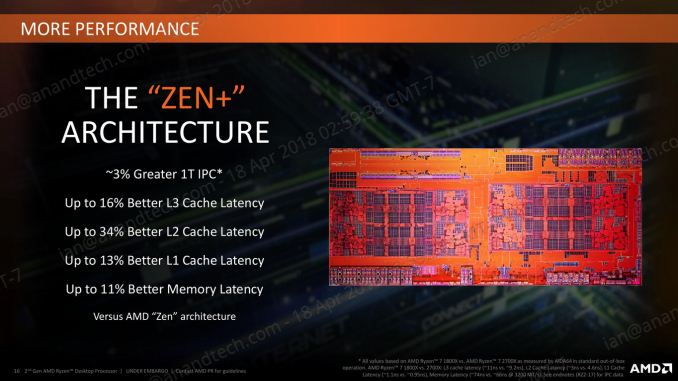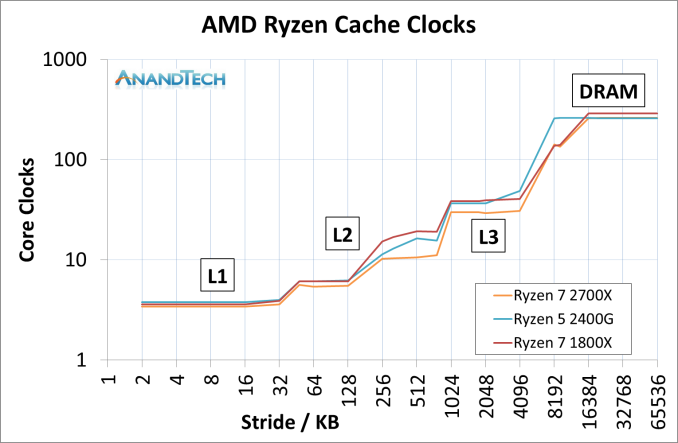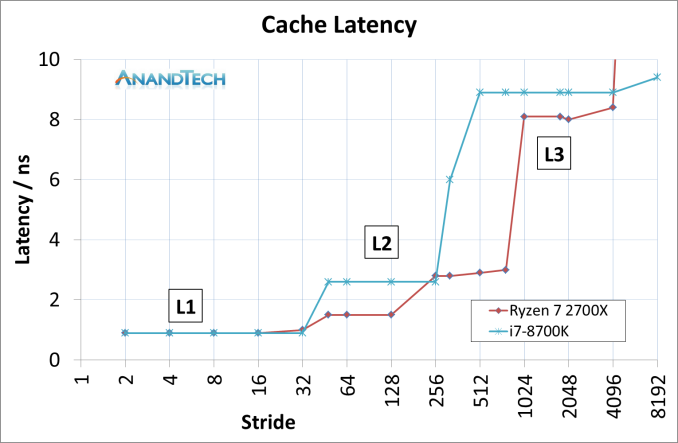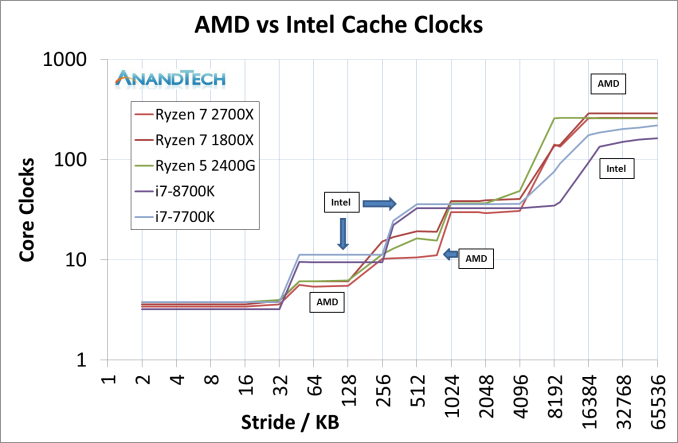The AMD 2nd Gen Ryzen Deep Dive: The 2700X, 2700, 2600X, and 2600 Tested
by Ian Cutress on April 19, 2018 9:00 AM ESTImprovements to the Cache Hierarchy
The biggest under-the-hood change for the Ryzen 2000-series processors is in the cache latency. AMD is claiming that they were able to knock one-cycle from L1 and L2 caches, several cycles from L3, and better DRAM performance. Because pure core IPC is intimately intertwined with the caches (the size, the latency, the bandwidth), these new numbers are leading AMD to claim that these new processors can offer a +3% IPC gain over the previous generation.
The numbers AMD gives are:
- 13% Better L1 Latency (1.10ns vs 0.95ns)
- 34% Better L2 Latency (4.6ns vs 3.0ns)
- 16% Better L3 Latency (11.0ns vs 9.2ns)
- 11% Better Memory Latency (74ns vs 66ns at DDR4-3200)
- Increased DRAM Frequency Support (DDR4-2666 vs DDR4-2933)
It is interesting that in the official slide deck AMD quotes latency measured as time, although in private conversations in our briefing it was discussed in terms of clock cycles. Ultimately latency measured as time can take advantage of other internal enhancements; however a pure engineer prefers to discuss clock cycles.
Naturally we went ahead to test the two aspects of this equation: are the cache metrics actually lower, and do we get an IPC uplift?
Cache Me Ousside, How Bow Dah?
For our testing, we use a memory latency checker over the stride range of the cache hierarchy of a single core. For this test we used the following:
- Ryzen 7 2700X (Zen+)
- Ryzen 5 2400G (Zen APU)
- Ryzen 7 1800X (Zen)
- Intel Core i7-8700K (Coffee Lake)
- Intel Core i7-7700K (Kaby Lake)
The most obvious comparison is between the AMD processors. Here we have the Ryzen 7 1800X from the initial launch, the Ryzen 5 2400G APU that pairs Zen cores with Vega graphics, and the new Ryzen 7 2700X processor.
This graph is logarithmic in both axes.
This graph shows that in every phase of the cache design, the newest Ryzen 7 2700X requires fewer core clocks. The biggest difference is on the L2 cache latency, but L3 has a sizeable gain as well. The reason that the L2 gain is so large, especially between the 1800X and 2700X, is an interesting story.
When AMD first launched the Ryzen 7 1800X, the L2 latency was tested and listed at 17 clocks. This was a little high – it turns out that the engineers had intended for the L2 latency to be 12 clocks initially, but run out of time to tune the firmware and layout before sending the design off to be manufactured, leaving 17 cycles as the best compromise based on what the design was capable of and did not cause issues. With Threadripper and the Ryzen APUs, AMD tweaked the design enough to hit an L2 latency of 12 cycles, which was not specifically promoted at the time despite the benefits it provides. Now with the Ryzen 2000-series, AMD has reduced it down further to 11 cycles. We were told that this was due to both the new manufacturing process but also additional tweaks made to ensure signal coherency. In our testing, we actually saw an average L2 latency of 10.4 cycles, down from 16.9 cycles in on the Ryzen 7 1800X.
The L3 difference is a little unexpected: AMD stated a 16% better latency: 11.0 ns to 9.2 ns. We saw a change from 10.7 ns to 8.1 ns, which was a drop from 39 cycles to 30 cycles.
Of course, we could not go without comparing AMD to Intel. This is where it got very interesting. Now the cache configurations between the Ryzen 7 2700X and Core i7-8700K are different:
| CPU Cache uArch Comparison | ||
| AMD Zen (Ryzen 1000) Zen+ (Ryzen 2000) |
Intel Kaby Lake (Core 7000) Coffee Lake (Core 8000) |
|
| L1-I Size | 64 KB/core | 32 KB/core |
| L1-I Assoc | 4-way | 8-way |
| L1-D Size | 32 KB/core | 32 KB/core |
| L1-D Assoc | 8-way | 8-way |
| L2 Size | 512 KB/core | 256 KB/core |
| L2 Assoc | 8-way | 4-way |
| L3 Size | 8 MB/CCX (2 MB/core) |
2 MB/core |
| L3 Assoc | 16-way | 16-way |
| L3 Type | Victim | Write-back |
AMD has a larger L2 cache, however the AMD L3 cache is a non-inclusive victim cache, which means it cannot be pre-fetched into unlike the Intel L3 cache.
This was an unexpected result, but we can see clearly that AMD has a latency timing advantage across the L2 and L3 caches. There is a sizable difference in DRAM, however the core performance metrics are here in the lower caches.
We can expand this out to include the three AMD chips, as well as Intel’s Coffee Lake and Kaby Lake cores.
This is a graph using cycles rather than timing latency: Intel has a small L1 advantage, however the larger L2 caches in AMD’s Zen designs mean that Intel has to hit the higher latency L3 earlier. Intel makes quick work of DRAM cycle latency however.














545 Comments
View All Comments
fallaha56 - Thursday, April 19, 2018 - link
I’m not -I’m jst showing how stupid your OP wasIf someone is selling an entry level chip for the same price as someone else’s that’s the comparison
Include the platform costs if you like but that’s what matters -bang for buck
Only for .1% of people does performance at any costs matter
Ninjawithagun - Thursday, April 19, 2018 - link
Actually no. Once again proving you do not know how to count to 8.LurkingSince97 - Thursday, April 19, 2018 - link
Um... NO.Sure, in some cases it is possible to compare two processors of 'equal quality' and then look at cost second.
But that is an impossible task in a review. And for some processors it is impossible for anyone.
This is impossible because there is no such thing as an 'equal quality chip'. Subjectively, I might be able to find two chips that I think are roughly equal, then compare price. But this is subjective -- depending on what my needs are.
Price is objective. We can compare two system builds at nearly equal cost directly, then see what is better. Comparing 'roughly equal' chips first starts out in the wrong place for most consumers. Only those that are not very price sensitive do that -- get the 'best' for what they want, and if there are two equal things use price as a tie breaker. Most people are looking for the best they can get for a price, rather than the lower price for what they want.
Now, to make it worse, by your reasoning the 2700X can not be compared to anything, because the core counts differ. Bull$#17. I could just as easily say that the 8700K can not be compared to the 2600X because it can overclock to 5Ghz, so they are not technically the same.
There is absolutely reason to compare 8C/16T products to 6C/12T to 4C/8T products -- BECAUSE PEOPLE HAVE TO PICK ONE TO BUY.
LurkingSince97 - Thursday, April 19, 2018 - link
Incorrect. Q.E.D.bji - Thursday, April 19, 2018 - link
You are completely wrong, and Krysto is correct. Performance per dollar is the metric of greatest relevance for the vast majority of users and thus is the most useful metric to use in reviews.mapesdhs - Saturday, April 21, 2018 - link
Maybe Ninjawithagun is just crazy rich and doesn't care about price. :)Targon - Monday, April 23, 2018 - link
Performance per dollar for the workload you care about is what you are talking about, since game performance doesn't matter much in business, but being able to do whatever the day to day work as quickly as possible is. That may mean lower core counts with high clock speeds will be more important, or higher core counts will beat out most other things(16+ cores at 1.5GHz might beat out 4 cores at 5GHz). It all depends.Ryan Smith - Thursday, April 19, 2018 - link
"Why does every review keep making the same mistake?? It has nothing to do with price. Comparing like CPU architectures is the only logical course of action."To abuse an already overused meme here, why not both? This is why we have the data for all of these parts.
Our focus is on price comparisons, because at the end of the day most readers will make their buying decisions around a given budget. But there is also plenty here looking into IPC and other architectural elements.
Cooe - Thursday, April 19, 2018 - link
Lol don't feed him Ryan! As one of our so gracious and glorious overloads it pains me to see you get into the mud with that dingus. Leave that to us nobodies :).Ninjawithagun - Thursday, April 19, 2018 - link
Ignorance is your bliss.